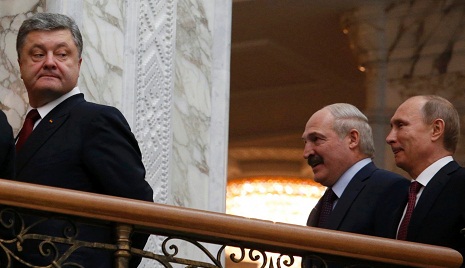Details began to emerge after more than 12 hours of peace talks in the Minsk, the capital of Belarus, with one source saying there was hope agreement could be reached and another saying a document would be signed, according to news agencies.
But the document may be a joint declaration rather than a full agreement, and signed by lower-level envoys rather than the leaders themselves, said Reuters, quoting sources.
Any agreement would however be sent to a “contact group” that includes representatives of the pro-Russian rebels, whose involvement could be crucial, Reuters was told.
The Minsk talks went for more than 12 hours over Wednesday night in the Belarussian capital as European leaders tried to broker a deal to end fighting.
More than 5,300 people have died since April in the conflict between Ukrainian forces and Russia-backed separatists in two eastern provinces and the bloodshed rose sharply in recent weeks.
As President Barack Obama faces rising calls at home to send military aid to Ukraine, European leaders fear it would only aggravate the fight. Russia, meanwhile, faces a severe economic downturn driven in part by sanctions the west has imposed for supporting the separatists with troops and equipment, which Russia vehemently denies it is doing.
The urgency felt by all sides appeared to be underlined by the extraordinary length and discomfort of the talks between the leaders of Ukraine, Russia, France and Germany. They sat down with each other Wednesday evening in the Belarusian capital and the talks continued as sunrise neared on Thursday.
In a diplomatic blitz that began last week, German Chancellor Angela Merkel and French President Francois Hollande visited Kiev and Moscow to speak to Ukrainian President Petro Poroshenko and Russian President Vladimir Putin, paving the way for the marathon session in Minsk.
“The entire world is waiting to see whether the situation moves toward de-escalation, weapons pullback, ceasefire, or ... spins out of control,” Poroshenko said upon arriving.
The Russian foreign minister, Sergey Lavrov, signalled some progress, saying late on Wednesday that the talks were “active, better than super”. But it was unclear when a decision might be announced and how soon the shooting would stop if an agreement was reached.
A top rebel official, Andrei Purgin, told Russian television that it might take a day or more for hostilities to end even if a ceasefire was called.
On Wednesday the French foreign minister, Laurent Fabius, said “quite a number of problems remain” in negotiations including the future of eastern Ukraine, guarantees about the Ukraine-Russia border and the prospects of a possible ceasefire, weapons pullback and prisoner exchange.
Fabius said the aim of the talks was to win an accord that works on the ground, “not just one on paper.”
Germany and France rushed to mediate after a recent surge in fighting that continued on Wednesday. In the rebel-held city of Donetsk rebel officials said five people were killed and nine wounded in a shelling attack on a bus station; An Associated Press reporter saw one body. Officials in Kiev said 19 troops were also killed and 78 wounded in fighting in Debaltseve, a hotly contested transport hub in eastern Ukraine.
More about:
















































